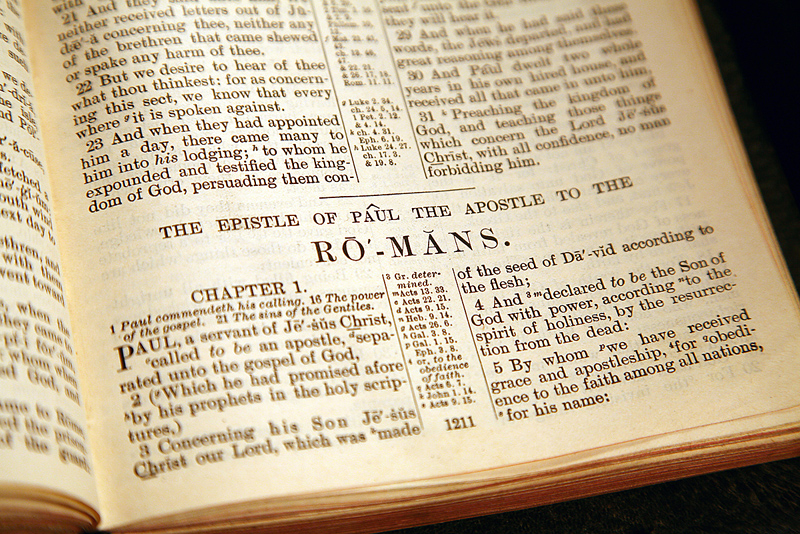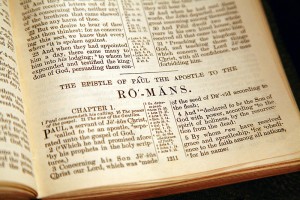Romans 3:19,
Now we know that what things soever the law [Torah] says, it says to them who are under the law: that every mouth may be stopped, and all the world may become guilty before Elohim.
When Paul uses the term “under the law” is he referring to those who are keepers of the law (like the Jews were)? Is he further implying that if one isn’t “under the law” one is free to break the law? This is a viewpoint many people in the church have been led to believe Paul is advocating. Let’s analyze what Paul is saying here and see it if lines up with what the Bible teaches.
First, if Paul is saying that those who aren’t under the law (because they’re “under grace” instead) are no longer under any obligation to adhere to the law’s tenets, then this means that it’s permissible to violate the law in regards to the Sabbath, the biblical dietary laws, the feasts, idolatry, murder, lying, theft, rape, incest, witchcraft, homosexuality and so on. This line of reasoning crumbles when we realize that from the Bible’s viewpoint, the Torah-law of Elohim is indivisible: it stands or falls as a unit. James says that if one violates one commandment he is guilty of breaking them all (Jas 2:8–10).
Second, if “under the law” means that believers are now free to disregard the Torah, then how do we explain all the scriptures that show us that Paul and the other apostles (and even Yeshua himself) upheld the validity of the Torah as a rule for the saint’s life? (See Matt 5:17–19; John 14:15; Rom 3:31; 6:14, 15; 7:12, 14, 22; Acts 21:24; 24:14; 25:8; 1 Cor 7:19; 1 John 2:3–6; 3:4.) It is evident that Paul can’t, at the same time, be both teaching against and advocating Torah-obedience. This would make Paul into a duplicitous liar and hypocrite, and call into question the validity and divine inspiration of the Scriptures as well. The fact is, the problem isn’t with Paul or the Bible, but with man’s faulty interpretation of YHVH’s Scriptures.
So when we strip away the layers of men’s church doctrines and traditions, what is Paul really saying in Romans 3:19?
Paul is exposing the Jews for being over-confident in their special relationship with YHVH because (a) they were Jews and the seed of Abraham, (b) because YHVH had given them the Torah, and (c) because they were circumcised. Yet despite these facts, many Jews had failed to obey the Torah, thus making their outward appearance of righteousness (i.e., their circumcision) an act of hypocrisy. Paul takes the Jews to task for this hypocrisy and declares that whether one is uncircumcised or not is immaterial; rather, what matters to YHVH is one’s heart orientation toward him (i.e., is one circumcised in heart or not, Rom 2–3:4). After all, logic decrees that circumcision can’t be a condition for salvation, since it’s impossible for one half of humanity (i.e., women) to be physically circumcised, while, at the same time, the entire population (both men and women) can be circumcised in heart!
Paul was being accused of promoting Torahlessness because of his stand that circumcision was not a salvation requirement, and that a Jew who is circumcised, and yet lives a Torahless life is no better than a Gentile sinner. In fact, an uncircumcised Gentile who follows the basics of the Torah that are written in his consciences will be blessed on the day of judgment (Rom 2:14–16).
Additionally, Paul is attempting to level the spiritual playing field (or to tear down the middle wall of separation, see Eph 2:14) between Jews and Gentiles by showing that a hypocritical, law-touting, circumcised Jew has no standing in righteousness before YHVH, while an uncircumcised Gentile who knows little about the Torah, yet follows the light of truth that he does possess with his whole heart has righteous standing before YHVH.
The bottom line is that all (both Jews and Gentiles) have sinned (i.e., violated the Torah, 1 John 3:4), and all are under sin’s death penalty (Rom 3:9–19).
After declaring that all men are sinners (Rom 3:9–18), Paul brings in the concept of under the law and relates this to man being “guilty before Elohim” (Rom 3:19). That is to say, since each man has sinned (i.e., violated the Torah, 1 John 3:4), each one has come under the penalty that the Torah prescribes for sin; that is, he has come under the law. Paul expresses this same concept elsewhere when he writes, “For as many as are of the works of the law are under the curse: for it is written, ‘Cursed is every one that continues not in all things which are written in the book of the law to do them’” (Gal 3:10).
Paul is coming against those who, in his day, put their trust in their own ability to punctiliously obey YHVH’s Torah assuming that this would put them in right standing before Elohim (Rom 3:20). Paul is attempting to correct this spiritual delusion, since no man can keep the law perfectly without sinning, for if he violates but one commandment, he brings upon himself the law’s death penalty and is now under the law. In other words, anyone who sins by breaking one of the least of the Torah’s commandments comes under the curse of the law, which is death, for the Word of Elohim teaches us that the person who sins will die (Ezek 18:4), and the wages of sin is death (Rom 6:23).
Therefore, since the Torah defines sin, it cannot at the same time bring man to right standing (or righteousness) before YHVH, since all men are guilty before Elohim of violating the Torah (Rom 3:19–20, 23).
Paul goes on to explain through the remainder of the chapter that we are made righteous (or cleansed from sin or Torahlessness) because of our faith in Yeshua, but that this in no way invalidates (or makes void) the Torah, but rather establishes the Torah (Rom 3:22–31), since, even though the Torah defines what sin is, and the stipulates the penalties for its violation, the Torah also shows us the path of righteous that will keep us from sinning and hence from coming under the laws penalty for sin.







